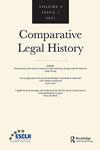Editorial
IF 0.5
Q2 LAW
引用次数: 0
Abstract
We are delighted to present another exciting issue of Comparative Legal History, the official journal of the European Society for Comparative Legal History (ESCLH). In the first article, Shaunnagh Dorsett sheds light on judge Barron Field’s attempts to reform Gibraltar’s procedural law in the 1830s. Although the reform failed, its history tells a lot about the movement of ideas in the early-nineteenthcentury British Empire. The reader is left convinced of how useful it is do colonial legal history comparatively. Claudia Passarella’s article continues to delve into the history of procedural law. Passarella’s emphasis is on the relationship between professional judges and laypersons in criminal matters, which she approaches by comparing the decision-making procedures in Italy and Ireland in the late nineteenth and early twentieth century. The author demonstrates how two countries with different legal traditions adopted different solutions when facing similar problems. In the third article of this issue, Thomas Mohr assesses the value of law journals as historical sources for the period between 1922 and 1939 after the partitioning of the island of Ireland. Law journals were not passive observers of the partitioning process. Instead, ‘having to cater for two diverging jurisdictions on the island of Ireland in place of one’, they ‘needed to engage with legal and constitutional developments within the wider Empire’. From the perspective of legal journals, Mohr also provides a comparative analysis of this process of adaptation. As always, the reviews section contains an interesting selection of reviews on recent books. We wish our readers inspiring moments with this issue of Comparative Legal History!编辑
我们很高兴向您介绍另一期激动人心的《比较法律史》,这是欧洲比较法律史学会(ESCLH)的官方期刊。在第一篇文章中,Shaunnah Dorsett阐述了法官Barron Field在19世纪30年代试图改革直布罗陀的诉讼法。虽然改革失败了,但它的历史告诉了许多关于20世纪初大英帝国思想运动的信息。读者相信,与殖民地法律史相比,它是多么有用。克劳迪娅·帕萨雷拉的文章继续深入探讨程序法的历史。帕萨雷拉的重点是刑事事务中专业法官和非专业人员之间的关系,她通过比较19世纪末和20世纪初意大利和爱尔兰的决策程序来处理这一关系。作者展示了两个法律传统不同的国家在面临类似问题时如何采取不同的解决方案。在本期的第三篇文章中,托马斯·莫尔评估了1922年至1939年爱尔兰岛分裂后法律期刊作为历史来源的价值。法律期刊并不是分割过程的被动观察者。相反,“必须照顾爱尔兰岛上两个不同的司法管辖区,而不是一个”,他们“需要参与更广泛的帝国内部的法律和宪法发展”。莫尔还从法律期刊的角度对这一改编过程进行了比较分析。和往常一样,评论部分包含了一系列有趣的新书评论。我们希望我们的读者在这期《比较法律史》中有鼓舞人心的时刻!
本文章由计算机程序翻译,如有差异,请以英文原文为准。
求助全文
约1分钟内获得全文
求助全文
来源期刊
CiteScore
1.70
自引率
0.00%
发文量
20
期刊介绍:
Comparative Legal History is an international and comparative review of law and history. Articles will explore both ''internal'' legal history (doctrinal and disciplinary developments in the law) and ''external'' legal history (legal ideas and institutions in wider contexts). Rooted in the complexity of the various Western legal traditions worldwide, the journal will also investigate other laws and customs from around the globe. Comparisons may be either temporal or geographical and both legal and other law-like normative traditions will be considered. Scholarship on comparative and trans-national historiography, including trans-disciplinary approaches, is particularly welcome.

 求助内容:
求助内容: 应助结果提醒方式:
应助结果提醒方式:


